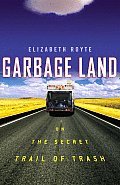 Garbage Land: On the Secret Trail of Trash, by Elizabeth Royte, was engaging non-fiction in the best "huh I didn't have a clue about that" kind of way. I thought I knew more about trash than the average person, having excavated or analyzed prehistoric garbage for about fifteen years. We have a composter and a garden, I've done some vermiculture and I have a well-thumbed copy of Worms Eat My Garbage. I've even read articles by William Rathje, the archaeologist that started "The Garbage Project" in Tucson in 1973, which compared the material evidence of people's consumption to what they thought they consumed (or said they used) in surveys.*
Garbage Land: On the Secret Trail of Trash, by Elizabeth Royte, was engaging non-fiction in the best "huh I didn't have a clue about that" kind of way. I thought I knew more about trash than the average person, having excavated or analyzed prehistoric garbage for about fifteen years. We have a composter and a garden, I've done some vermiculture and I have a well-thumbed copy of Worms Eat My Garbage. I've even read articles by William Rathje, the archaeologist that started "The Garbage Project" in Tucson in 1973, which compared the material evidence of people's consumption to what they thought they consumed (or said they used) in surveys.*But Royte showed me that I really didn't know much about landfills, san men, mongo, putrescibles, e-waste, recycling, or the sewage sludge industry. And she did this in a very easy to read first person account, describing her own attempts to quantify her kitchen garbage (weighing everything spread out on her daughter's plastic sled), and then following the different waste streams from her apartment in New York to their "final" resting places or re-uses.
Although the garbage itself is fascinating, it's the different people in this book that really make it work. They're helpful, they're patient, they stonewall, they're greedy, they're bitter, they make humanure in their backyards. Near the end of the book, Royte sums it all up:
Walking down the street now, I'd hear the distinctive knock of a packer truck's diesel engine and turn to see if it belonged to the Brooklyn 6. Perhaps one of the most important things I'd learned in the past year was the names of the people who took away my trash.
Garbage Land is fun to read, it makes you think before you buy something new (both about the item and the packaging), and it makes you think even harder about what you discard. Go read it.
*people lie about they eat & drink, or delude themselves that they eat more vegetables and drink less alcohol - check out Rubbish: The Archaeology of Garbage, by William L. Rathje and Cullen Murphy.
2 comments:
I got this review from Powell's "Review-a-Day" yesterday - looks like a good companion to Garbage Land: Not Buying It: My Year Without Shopping,by Judith Levine: http://www.powells.com/review/2006_03_13
Rathje, the other book you quote, was in my dept when I was an undergrad at U of A! : )
Garbology rules!
Post a Comment